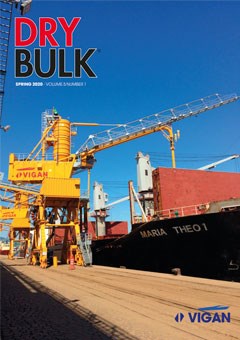Editorial comment
2020 will be a pivotal year for the UK’s ports. Globally, imperatives that the astute readers of Dry Bulk will recognise – such as the drive for lower emissions – will not just continue but increase in pace. Domestically in the UK, it will be a period of preparation for seismic change as the country leaves the EU and steps forward as an independent trading nation on the world stage. Scary? Maybe. Exciting? Definitely.
Register for free »
Get started now for absolutely FREE, no credit card required.
Let’s start globally. 2019 felt like it was a step change in the public discourse about climate change. Often led by teenage activists and graphically illustrated by catastrophic events such as the Australian bush fires, the debate and need for change has never been more pressing. In maritime we have the introduction in 2020 of the new IMO sulfur cap regulations. But many of us I’m sure would agree that more needs to happen and more quickly, moving beyond interim options like scrubbers.
For that change to be meaningful it must be across cargo and ship types, including, of course, dry bulk. Yet the truth is that in the ultimate global industry and one that is so heavily asset intensive, major change – at pace – can only occur with many stakeholders working together. At a global level, there is a crucial role not just for targets, but also the alignment of technical standards. At a national and local level, the provision of significant alternative fuelling options won’t occur without the provision of the supporting infrastructure. In the UK, the government’s ‘Clean Maritime Plan’ is a strong and welcome signal of direction of travel towards a zero emissions maritime future. But the lesson from other countries and regions on this pathway is that ambition also requires government funding.
We as a ports sector look forward to working with government to make funding and the change it will enable a reality. We look forward as well to continuing to work with our customers to capture the opportunities that the low emissions transition generates. Readers of Dry Bulk will know that biomass has emerged as a key commodity category for many UK ports, and long may that continue. Offshore renewable energy is another growth area, with ports able to deploy capabilities like complex lifting to support greater sustainability.
Here in the UK, December’s general election set a decisive course for departing the EU. Regardless of the politics, 2020 is destined to see a huge amount of practical work as the country sets its new relationship (and border arrangements) with the EU. It must also see a considerable step up in work on the UK’s new relationships across the world to capture the benefits and mitigate the issues of a new and independent trading status. The UK is an island nation and we will remain dependent on maritime trade and our ports for so many of our daily needs. Dry bulk categories are central to this with Ð to take one example, half of the UK’s food and feed needs are imported by sea, and the challenges for businesses can also be dramatically different. The vast majority of dry bulk trading and handling businesses are hugely experienced global traders already. Will it all be plain sailing from day one? Unlikely. But the UK’s ports have been preparing hard and are confident in their ability to ride out the immediate storms and keep Britain open for trade.
There should also be opportunities as well as challenges. The UK has reawakened to the importance of trade to the nation and we press to see this awareness translated into enduring change. As the country redoubles its efforts to be an attractive place to trade with, we want to see that effort extend to better road, rail and water connectivity for our ports. So, 2020 is going to be a busy and pivotal year for the UK’s ports, and working together provides the best opportunity for riding the waves and reaching a safe and mutually beneficial haven.


